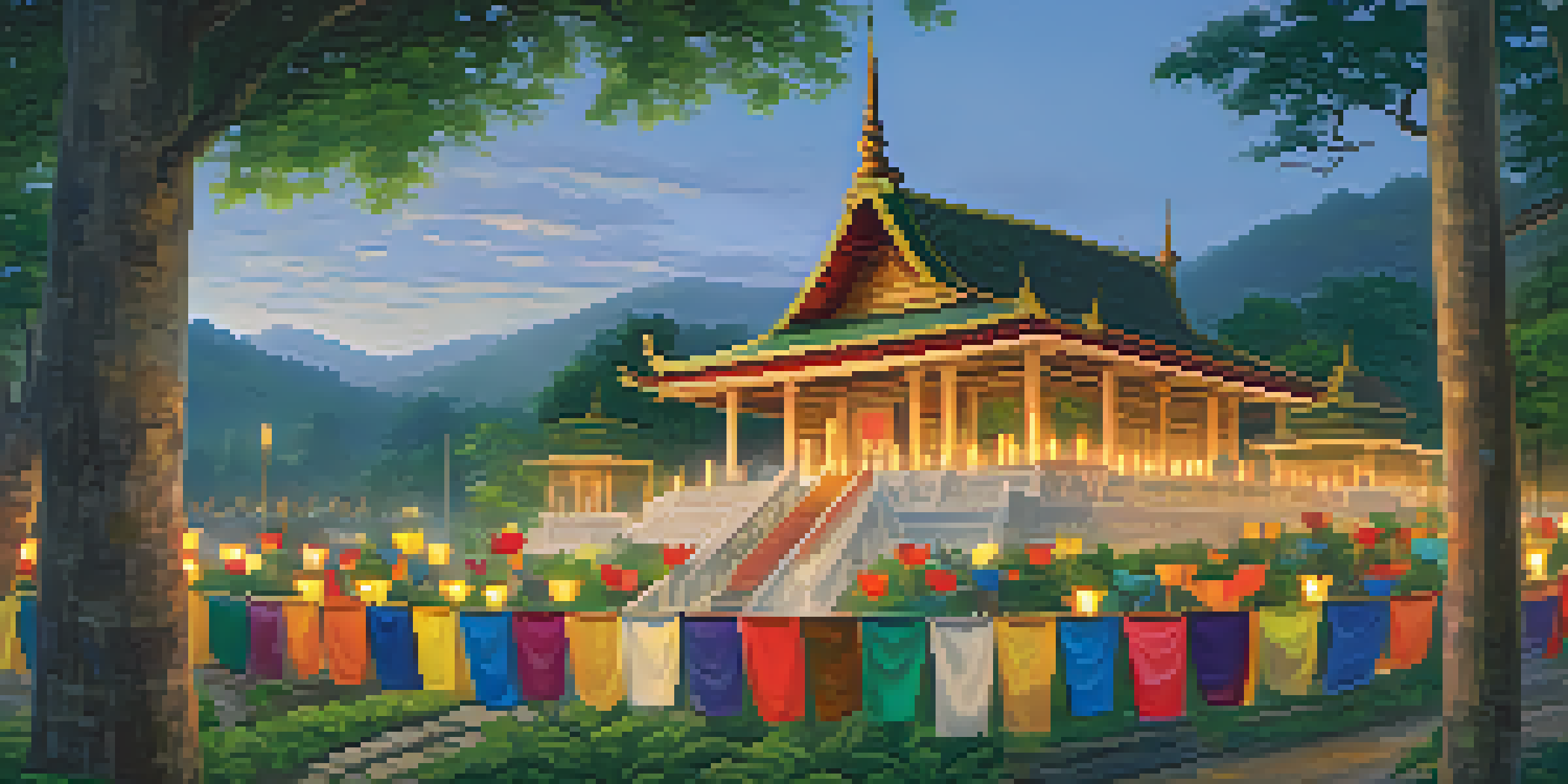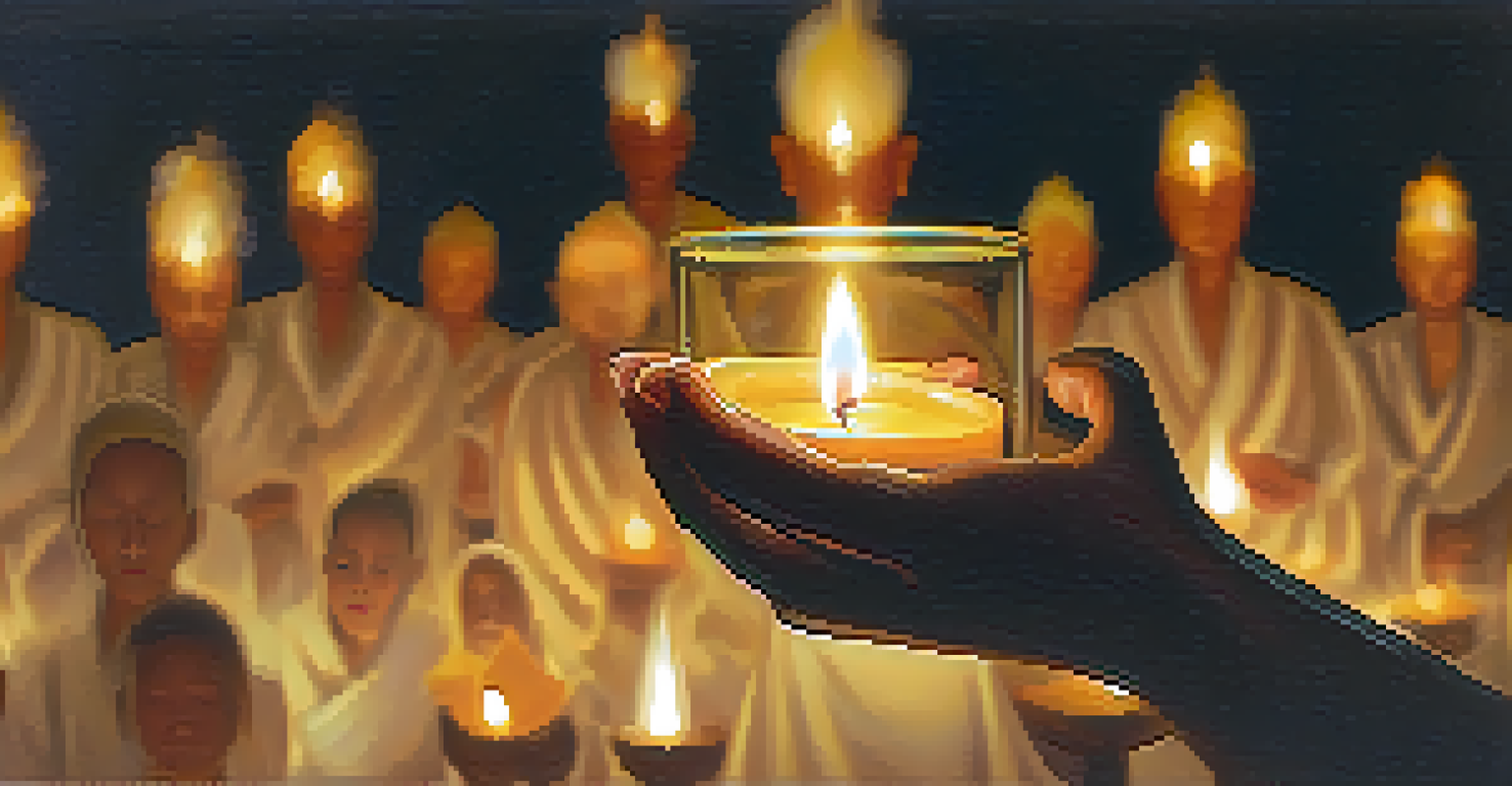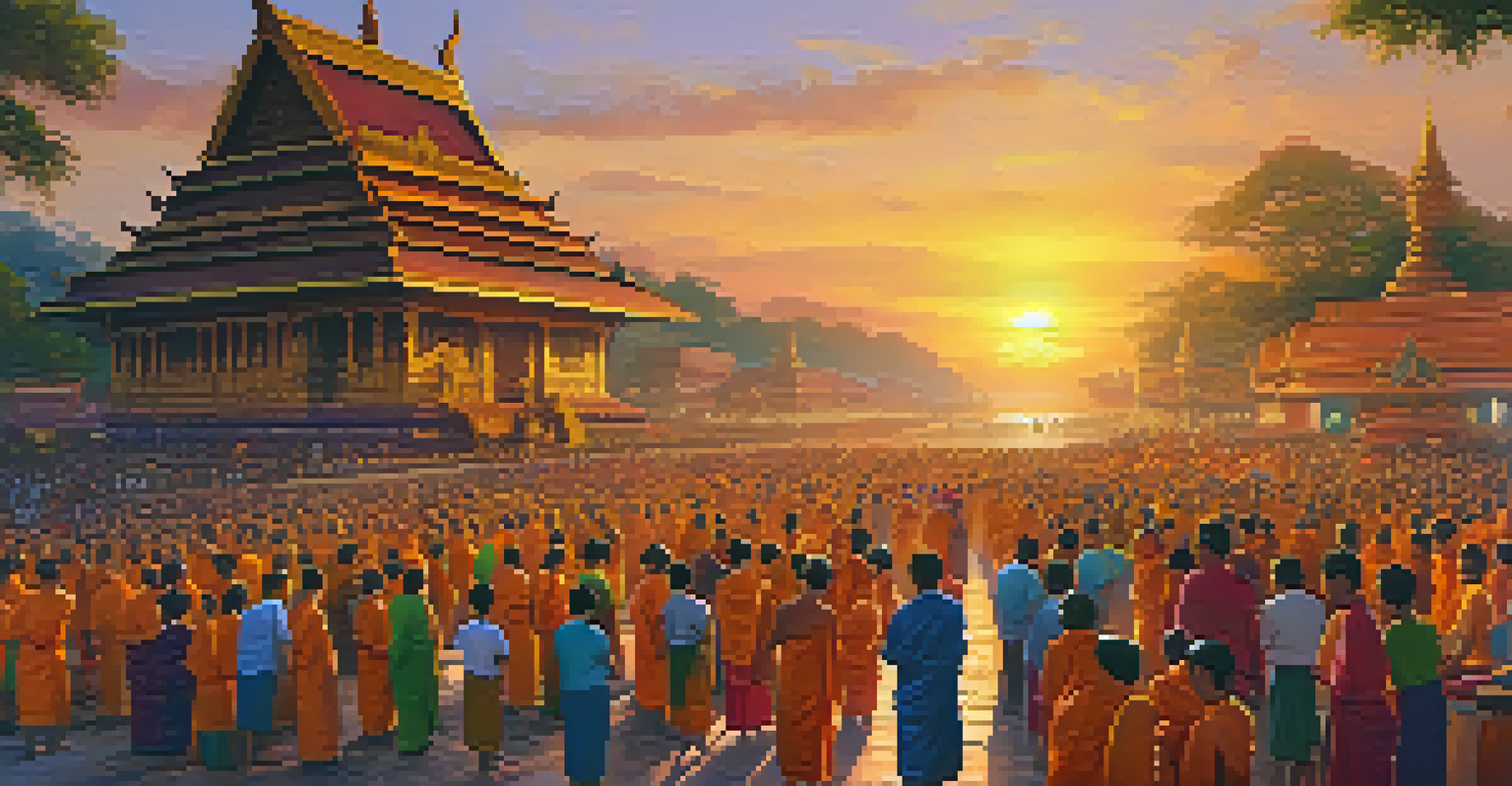Visakha Bucha: Celebrating the Life of the Buddha

Understanding Visakha Bucha and its Significance
Visakha Bucha is a significant Buddhist holiday celebrated by millions around the world. It commemorates the birth, enlightenment, and death of Siddhartha Gautama, who became the Buddha. Observed on the full moon day in May, this festival serves as a reminder of the Buddha's teachings and the path to enlightenment.
The mind is everything. What you think you become.
This day is not just about remembering the Buddha; it also encourages practitioners to reflect on their spiritual journey. By acknowledging these key events in the Buddha's life, devotees are inspired to embrace his teachings and apply them in their daily lives. This holistic celebration creates a deeper connection to the values of mindfulness and compassion.
During Visakha Bucha, many Buddhists engage in various rituals, such as visiting temples and making merit. These activities foster a sense of community and reinforce the teachings of the Buddha. Ultimately, it is a day that unites individuals in their quest for understanding and spiritual growth.
The Birth of the Buddha: A Momentous Occasion
The story of the Buddha's birth is a fascinating one, marked by auspicious signs and prophecies. He was born in Lumbini, Nepal, where his mother, Queen Maya, experienced a miraculous birth. It is said that he took seven steps immediately after birth and declared that this would be his last rebirth—a powerful symbolism that resonates with many.

This moment in history reminds us of the potential within every human being to achieve enlightenment. The Buddha's birth is not just a tale of an individual; it's a universal story about hope and the possibility of liberation from suffering. It encourages us to reflect on our own beginnings and the potential for growth and transformation.
Visakha Bucha Celebrates the Buddha
This holiday honors the key events in the life of Siddhartha Gautama, emphasizing mindfulness and compassion.
Celebrating this event during Visakha Bucha invites individuals to honor their own journeys. Just as the Buddha emerged into the world with purpose, we too are encouraged to find our own paths. This acknowledgment serves as a reminder to nurture our inner potential and strive for a more compassionate existence.
The Enlightenment: A Turning Point in History
The enlightenment of Siddhartha Gautama is perhaps the most pivotal moment in Buddhist history. After years of searching for truth and understanding, he attained enlightenment under the Bodhi tree in Bodh Gaya, India. This profound experience unveiled the Four Noble Truths, which form the foundation of Buddhist philosophy.
Peace comes from within. Do not seek it without.
The Four Noble Truths address the nature of suffering, its origins, and the path to liberation. They serve as a guide for individuals seeking to navigate the complexities of life. This moment of enlightenment is celebrated during Visakha Bucha as it represents the awakening that can occur within each of us.
By reflecting on this transformational event, practitioners are encouraged to pursue their own journeys toward enlightenment. It is a reminder that while the path may be challenging, the rewards are profound. This celebration emphasizes the importance of perseverance and understanding in our quest for inner peace.
The Buddha's Death: A Lesson in Impermanence
The death of the Buddha, known as Parinirvana, marks the end of his physical existence but the continuation of his teachings. He passed away at the age of 80 in Kushinagar, India, imparting his final teachings to his followers. This event underscores the Buddhist understanding of impermanence, a key concept in the philosophy.
Parinirvana serves as a poignant reminder that all life is transient. It highlights the importance of living in the present moment and cherishing the time we have. The teachings of the Buddha encourage us to accept change and find peace in the ever-evolving nature of existence.
Community Enhances Spiritual Growth
The celebration fosters a sense of belonging, reinforcing the interconnectedness among practitioners on their paths to enlightenment.
During Visakha Bucha, the reflection on the Buddha's death prompts individuals to contemplate their own lives. It encourages us to let go of attachments and embrace the present. This understanding of impermanence fosters compassion and mindfulness, essential qualities for a fulfilling life.
Rituals and Practices on Visakha Bucha
Visakha Bucha is a day filled with various rituals and practices that bring the community together in celebration. Many Buddhists visit temples, where they participate in meditation, chanting, and making merit through good deeds. These actions help deepen their connection to the Buddha's teachings and the larger Buddhist community.
Another common practice is the act of offering food and gifts to monks. This gesture not only supports the monastic community but also symbolizes the sharing of blessings and goodwill. Such acts of generosity are central to Buddhist practice, reinforcing the importance of compassion and altruism.
The day often concludes with candlelight processions, where participants walk in a circle around the temple, holding candles and incense. This symbolizes the light of the Buddha's teachings illuminating the path to enlightenment. It’s a beautiful way to end the day, reminding everyone of the shared journey toward understanding and compassion.
The Importance of Community in Celebrating Visakha Bucha
Community plays a vital role in the celebration of Visakha Bucha, as it brings individuals together in a shared purpose. This sense of belonging fosters a supportive environment where practitioners can grow and learn from one another. It highlights the interconnectedness of all beings, a core tenet of Buddhist philosophy.
During this festival, the collective energy of the community enhances the spiritual experience for everyone involved. Sharing rituals and practices creates bonds that extend beyond the day itself, fostering a sense of unity and shared values. This communal aspect reinforces the idea that we are stronger together in our pursuit of enlightenment.
Ongoing Practice Beyond the Holiday
Visakha Bucha encourages individuals to integrate the Buddha's teachings into their daily lives for lasting transformation.
Ultimately, Visakha Bucha serves as a reminder of the importance of community in personal growth. By supporting one another, practitioners can navigate their paths with greater resilience and understanding. This celebration emphasizes that while the journey is personal, the support we give each other is invaluable.
Embracing the Teachings of the Buddha Beyond Visakha Bucha
While Visakha Bucha is a day of celebration, it also serves as a catalyst for ongoing reflection and practice. The teachings of the Buddha are not confined to a single day; instead, they are meant to be integrated into our daily lives. This integration helps cultivate a deeper understanding of compassion, mindfulness, and wisdom.
By embracing these teachings year-round, practitioners can transform their lives and the lives of those around them. Whether through meditation, acts of kindness, or simply living mindfully, each action contributes to a more harmonious existence. This commitment to the teachings can lead to profound personal and collective change.

In conclusion, Visakha Bucha is not just an event; it's an invitation to live out the principles of the Buddha every day. As we celebrate his life and teachings, let us carry that spirit forward, inspiring others and fostering compassion in our communities. This ongoing journey is what truly honors the essence of the Buddha's legacy.